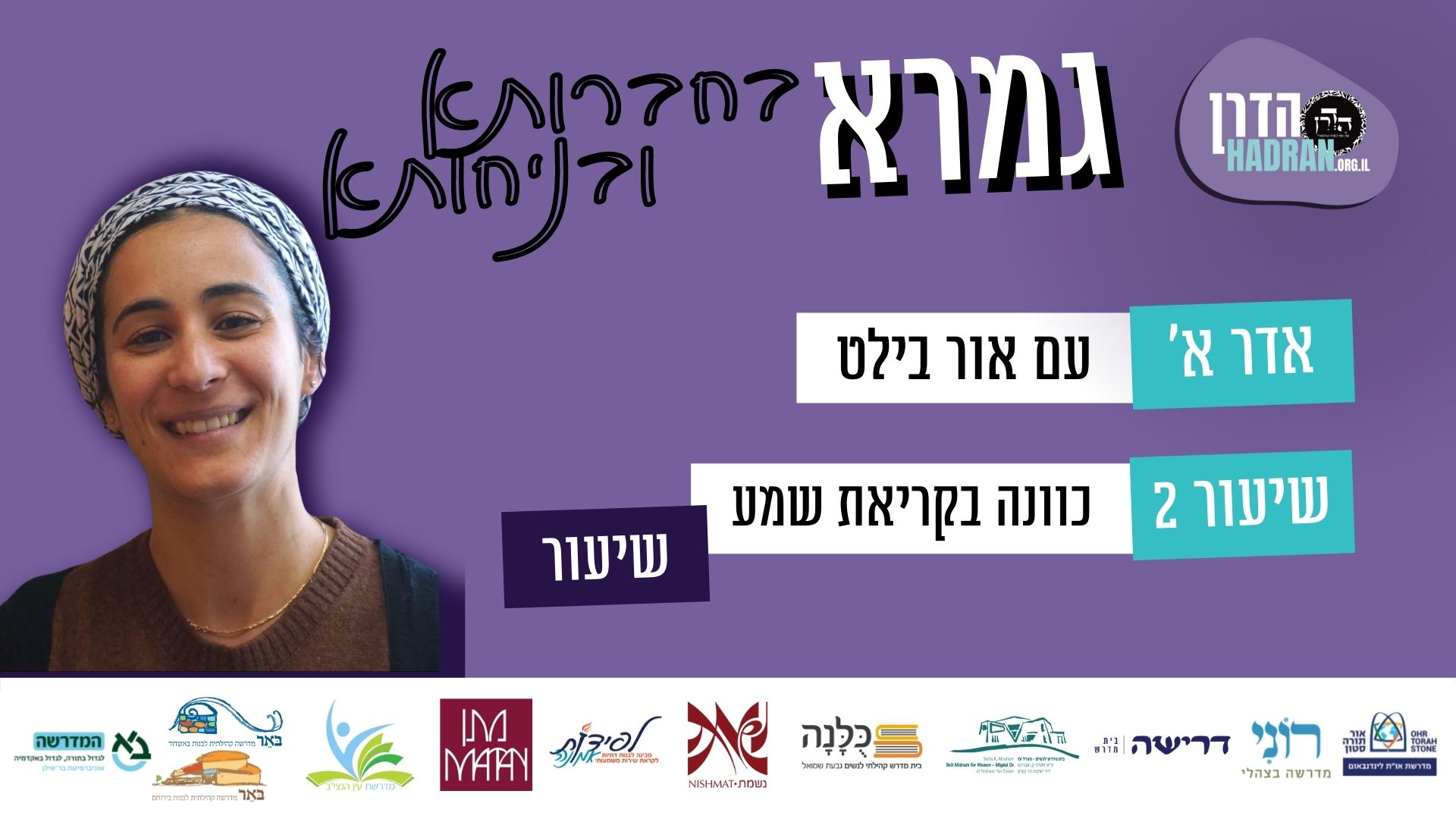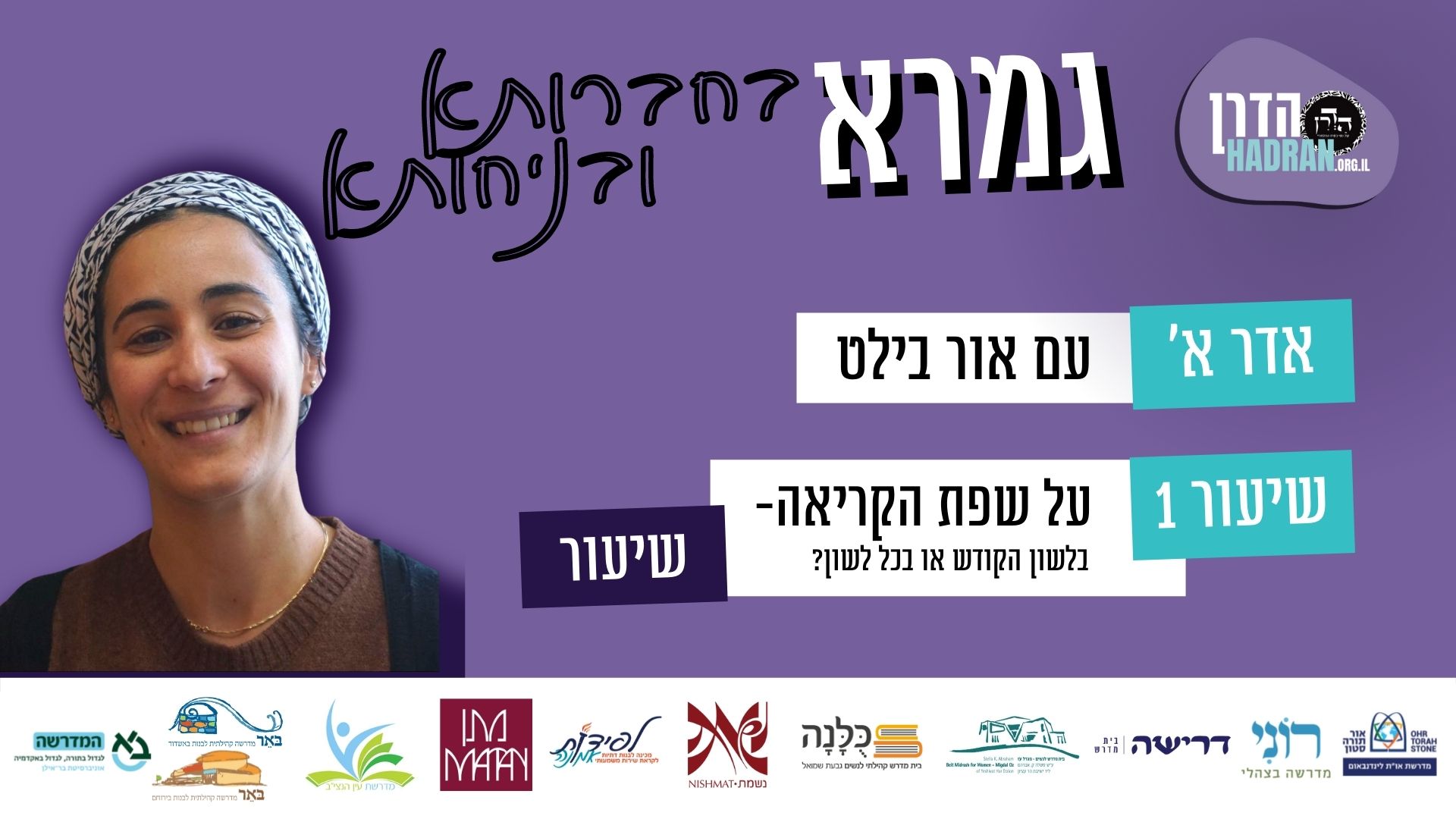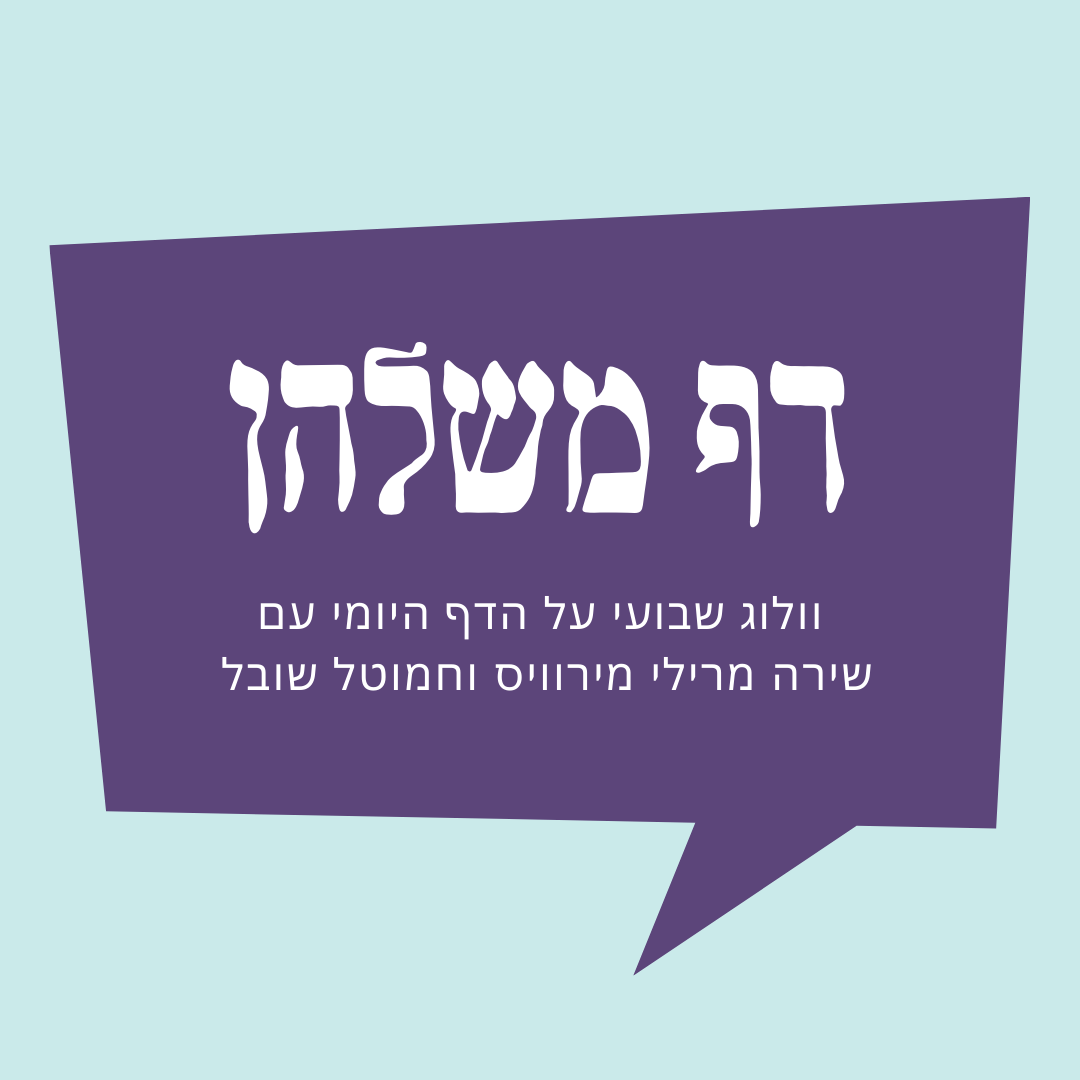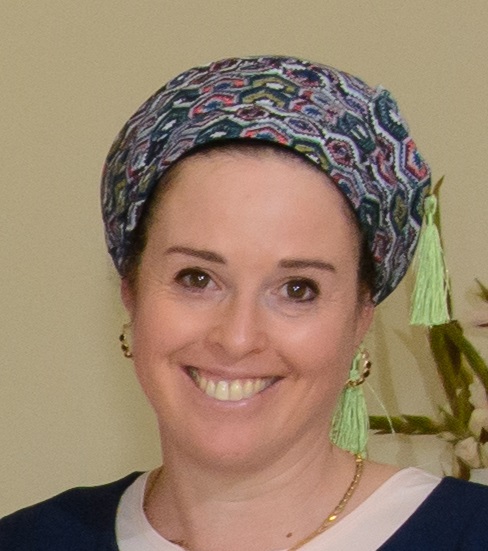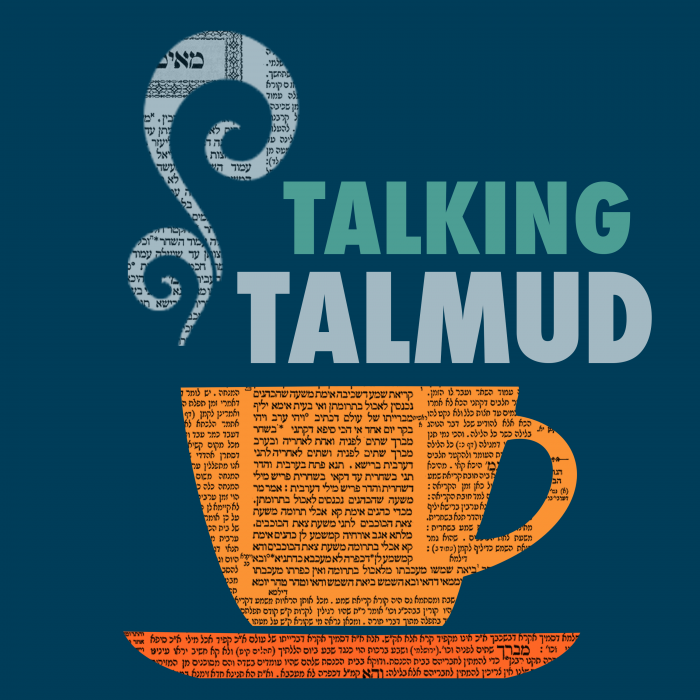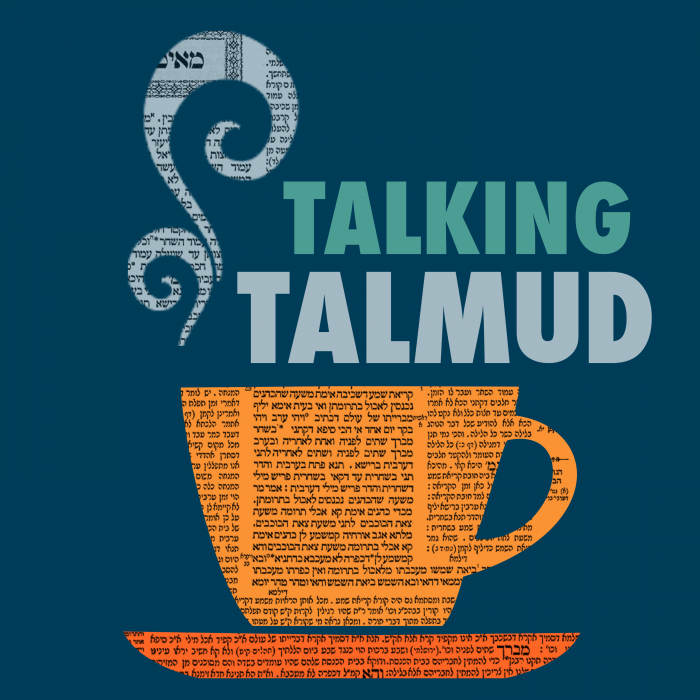ברכות כג
מָר סָבַר: אִם שָׁהָה כְּדֵי לִגְמוֹר אֶת כּוּלָּהּ — חוֹזֵר לָרֹאשׁ. וּמַר סָבַר: לְמָקוֹם שֶׁפָּסַק.
One Sage held that, as a rule, if one interrupted his prayer and delayed continuing his prayer for an interval sufficient to complete the entire prayer, he returns to the beginning of the prayer. And one Sage held: He returns to the place in the prayer where he stopped.
אָמַר רַב אָשֵׁי: הַאי ״אִם שָׁהָה״, אִם לֹא שָׁהָה מִיבְּעֵי לֵיהּ! אֶלָּא, דְּכוּלֵּי עָלְמָא אִם שָׁהָה כְּדֵי לִגְמוֹר אֶת כּוּלָּהּ — חוֹזֵר לָרֹאשׁ, וְהָתָם בִּדְלֹא שָׁהָה קָמִיפַּלְגִי, דְּמָר סָבַר גַּבְרָא דְחוּיָא הוּא, וְאֵין רָאוּי, וְאֵין תְּפִלָּתוֹ תְּפִלָּה. וּמַר סָבַר גַּבְרָא חַזְיָא הוּא, וּתְפִלָּתוֹ תְּפִלָּה.
Rejecting this possibility, Rav Ashi said: If that was the crux of their dispute, they should have discussed the element of: If he delayed, and: If he did not delay. Nowhere in their dispute do they mention the matter of how long the delay was for. Rather, everyone, both Rav Ḥisda and Rav Hamnuna, agrees that if one delayed continuing his prayer for an interval sufficient to complete the entire prayer, he returns to the beginning of the prayer. And there, in the dispute under discussion, they disagree with regard to one who did not delay that long. The dispute centers on the status of the one praying in this particular case. As one Sage holds that since he evidently needed to urinate before starting his prayer, he is a man who was disqualified, and unfit for prayer, and his prayer is not a valid prayer; therefore he must repeat it in its entirety. And one Sage holds he is a man who was fit for prayer and his prayer is a valid prayer.
תָּנוּ רַבָּנַן: הַנִּצְרָךְ לִנְקָבָיו — אַל יִתְפַּלֵּל, וְאִם הִתְפַּלֵּל — תְּפִלָּתוֹ תּוֹעֵבָה. אָמַר רַב זְבִיד וְאִיתֵּימָא רַב יְהוּדָה: לֹא שָׁנוּ אֶלָּא שֶׁאֵינוֹ יָכוֹל לִשְׁהוֹת בְּעַצְמוֹ, אֲבָל אִם יָכוֹל לִשְׁהוֹת בְּעַצְמוֹ — תְּפִלָּתוֹ תְּפִלָּה.
The Sages taught in a baraita: One who needs to relieve himself may not pray, and if he prayed, his prayer is an abomination. Rav Zevid and some say Rav Yehuda said in qualifying this statement: They only taught this halakha in a case where one cannot restrain himself. But, if he can restrain himself, his prayer is a valid prayer as he is not tarnished by his need to relieve himself.
וְעַד כַּמָּה? אָמַר רַב שֵׁשֶׁת: עַד פַּרְסָה. אִיכָּא דְּמַתְנֵי לַהּ אַמַּתְנִיתָא: בַּמֶּה דְּבָרִים אֲמוּרִים — כְּשֶׁאֵין יָכוֹל לַעֲמוֹד עַל עַצְמוֹ. אֲבָל אִם יָכוֹל לַעֲמוֹד עַל עַצְמוֹ — תְּפִלָּתוֹ תְּפִלָּה. וְעַד כַּמָּה? אָמַר רַב זְבִיד: עַד פַּרְסָה.
The Gemara asks: And for how long must he be able to restrain himself? Rav Sheshet said: For as long as it takes to walk one parasang. Some teach this halakha directly on what was taught in the baraita: In what case is this statement said? Where he is unable to restrain himself, but if he is able to restrain himself, his prayer is a valid prayer. And for how long? Rav Zevid said: For as long as it takes to walk one parasang.
אָמַר רַבִּי שְׁמוּאֵל בַּר נַחְמָנִי אָמַר רַבִּי יוֹנָתָן: הַנִּצְרָךְ לִנְקָבָיו — הֲרֵי זֶה לֹא יִתְפַּלֵּל, מִשּׁוּם שֶׁנֶּאֱמַר: ״הִכּוֹן לִקְרַאת אֱלֹהֶיךָ יִשְׂרָאֵל״.
Rabbi Shmuel bar Naḥmani said that Rabbi Yonatan said: One who needs to relieve himself may not pray, because it is stated: “Prepare to greet your God, O Israel” (Amos 4:12), and one must clear his mind of all distractions to prepare to receive the Lord during prayer.
וְאָמַר רַבִּי שְׁמוּאֵל בַּר נַחְמָנִי אָמַר רַבִּי יוֹנָתָן: מַאי דִּכְתִיב: ״שְׁמוֹר רַגְלְךָ כַּאֲשֶׁר תֵּלֵךְ אֶל בֵּית הָאֱלֹהִים״? שְׁמוֹר עַצְמְךָ שֶׁלֹּא תֶּחְטָא, וְאִם תֶּחְטָא — הָבֵא קׇרְבָּן לְפָנַי. ״וְקָרוֹב לִשְׁמֹעַ דִּבְרֵי חֲכָמִים״, אָמַר רָבָא: הֱוֵי קָרוֹב לִשְׁמוֹעַ דִּבְרֵי חֲכָמִים, שֶׁאִם חוֹטְאִים מְבִיאִים קׇרְבָּן וְעוֹשִׂים תְּשׁוּבָה. ״מִתֵּת הַכְּסִילִים זָבַח״ — אַל תְּהִי כַּכְּסִילִים שֶׁחוֹטְאִים וּמְבִיאִים קׇרְבָּן, וְאֵין עוֹשִׂים תְּשׁוּבָה.
In this context, the Gemara cites an additional statement, which Rabbi Shmuel bar Naḥmani said that Rabbi Yonatan said: What is the meaning of that which is written: “Guard your foot when you go to the house of God, and prepare to listen; it is better than when fools offer sacrifices, as they know not to do evil” (Ecclesiastes 4:17)? It means: When you enter the house of the Lord, guard yourself from transgression, and if you commit a transgression, bring a sacrifice before Me in atonement. The verse continues: “And draw near and listen to the words of the wise.” Rava said: Be prepared to hearken to the words of the wise, who, if they commit a transgression, they bring a sacrifice and repent. He interprets the next part of the verse: “It is better than when fools give sacrifices,” that one should not act like the fools who commit a transgression and bring a sacrifice but do not repent.
״כִּי אֵינָם יוֹדְעִים לַעֲשׂוֹת רָע״ אִי הָכִי צַדִּיקִים נִינְהוּ! אֶלָּא, אַל תְּהִי כַּכְּסִילִים שֶׁחוֹטְאִים וּמְבִיאִים קׇרְבָּן, וְאֵינָם יוֹדְעִים אִם עַל הַטּוֹבָה הֵם מְבִיאִים, אִם עַל הָרָעָה הֵם מְבִיאִים. אָמַר הַקָּדוֹשׁ בָּרוּךְ הוּא: בֵּין טוֹב לְרַע אֵינָן מַבְחִינִים, וְהֵם מְבִיאִים קׇרְבָּן לְפָנַי?!
Regarding the end of the verse: “As they know not to do evil,” the Gemara asks: If so, they are righteous. Rather it must be understood: Do not be like the fools who commit a transgression and bring a sacrifice, but are unaware whether they are bringing it as a thanks-offering for the good, or as an offering of atonement for the evil. This is the meaning of the verse: “As they know not to do evil”; they know not if and when their actions are evil. With regard to those individuals, the Holy One, Blessed be He, said: They cannot distinguish between good and evil and yet they bring a sacrifice before me?
רַב אָשֵׁי וְאִיתֵּימָא רַבִּי חֲנִינָא בַּר פָּפָּא אָמַר: שְׁמוֹר נְקָבֶיךָ בְּשָׁעָה שֶׁאַתָּה עוֹמֵד בִּתְפִלָּה לְפָנַי.
Rav Ashi and some say Rabbi Ḥanina bar Pappa said: Mind your orifices when you stand before me in prayer.
תָּנוּ רַבָּנַן: הַנִּכְנָס לְבֵית הַכִּסֵּא, חוֹלֵץ תְּפִילָּיו בְּרִחוּק אַרְבַּע אַמּוֹת, וְנִכְנָס. אָמַר רַב אַחָא בַּר רַב הוּנָא אָמַר רַב שֵׁשֶׁת: לֹא שָׁנוּ אֶלָּא בֵּית הַכִּסֵּא קָבוּעַ, אֲבָל בֵּית הַכִּסֵּא עֲרַאי — חוֹלֵץ, וְנִפְנֶה לְאַלְתַּר. וּכְשֶׁהוּא יוֹצֵא — מַרְחִיק אַרְבַּע אַמּוֹת, וּמַנִּיחָן, מִפְּנֵי שֶׁעֲשָׂאוֹ בֵּית הַכִּסֵּא קָבוּעַ.
The Sages taught: One who enters a bathroom must remove his phylacteries at a distance of four cubits and enter. Rav Aḥa bar Rav Huna said that Rav Sheshet said: This was only taught with regard to one entering a regular bathroom, but one who enters a makeshift bathroom may remove his phylacteries and defecate immediately. But when one exits from a makeshift bathroom, he must distance himself four cubits before donning his phylacteries because he has now rendered that place a regular bathroom.
אִיבַּעְיָא לְהוּ: מַהוּ שֶׁיִּכָּנֵס אָדָם בִּתְפִילִּין לְבֵית הַכִּסֵּא קָבוּעַ לְהַשְׁתִּין מַיִם? רָבִינָא שָׁרֵי, רַב אַדָּא בַּר מַתְנָא אָסַר. אֲתוֹ שַׁיְילוּהּ לְרָבָא, אָמַר לְהוּ: אָסוּר — חָיְישִׁינַן שֶׁמָּא יִפָּנֶה בָּהֶן. וְאָמְרִי לַהּ, שֶׁמָּא יָפִיחַ בָּהֶן.
A dilemma was raised before the Sages in the yeshiva: What is the halakha; may one enter a regular bathroom wearing his phylacteries in order to urinate? The Sages disagreed: Ravina permitted to do so while Rav Adda bar Mattana prohibited it. They came and asked this of Rava. He said to them: It is forbidden because we are concerned lest he will come to defecate with them still on. Others say that this halakha is because we are concerned that, since he is already in the bathroom, he might forget that his phylacteries are on his head and will break wind with them still on him.
תַּנְיָא אִידַּךְ: הַנִּכְנָס לְבֵית הַכִּסֵּא קָבוּעַ חוֹלֵץ תְּפִילָּיו בְּרִחוּק אַרְבַּע אַמּוֹת, וּמַנִּיחָן בַּחַלּוֹן הַסָּמוּךְ לִרְשׁוּת הָרַבִּים, וְנִכְנָס. וּכְשֶׁהוּא יוֹצֵא — מַרְחִיק אַרְבַּע אַמּוֹת, וּמַנִּיחָן, דִּבְרֵי בֵּית שַׁמַּאי. וּבֵית הִלֵּל אוֹמְרִים: אוֹחֲזָן בְּיָדוֹ, וְנִכְנָס. רַבִּי עֲקִיבָא אוֹמֵר: אוֹחֲזָן בְּבִגְדוֹ, וְנִכְנָס.
It was taught in another baraita: One who enters a regular bathroom must remove his phylacteries at a distance of four cubits, place them in the window in the wall of the bathroom adjacent to the public domain, and then enter. And when he exits, he must distance himself four cubits before donning them. This is the statement of Beit Shammai. Beit Hillel say: He must remove his phylacteries but he holds them in his hand and enters. Rabbi Akiva says: He holds them in his garment and enters.
בְּבִגְדוֹ סָלְקָא דַעְתָּךְ?! זִימְנִין מִישְׁתְּלֵי לְהוּ וְנָפְלִי! אֶלָּא אֵימָא: אוֹחֲזָן בְּבִגְדוֹ וּבְיָדוֹ, וְנִכְנָס.
The Gemara wonders: Does it enter your mind to say in his garment? There is room for concern because sometimes he forgets them and they fall. Rather, say: He holds them with his garment and in his hand and enters the bathroom. He holds the phylacteries in his hand and covers it with the garment.
וּמַנִּיחָם בַּחוֹרִין הַסְּמוּכִים לְבֵית הַכִּסֵּא, וְלֹא יַנִּיחֵם בַּחוֹרִין הַסְּמוּכִים לִרְשׁוּת הָרַבִּים, שֶׁמָּא יִטְּלוּ אוֹתָם עוֹבְרֵי דְרָכִים, וְיָבֹא לִידֵי חֲשָׁד.
It was established in the baraita: And if there is room to place them, he places them in the holes adjacent to the bathroom, but he does not place them in the holes adjacent to the public domain, lest the phylacteries will be taken by passersby and he will come to be suspect.
וּמַעֲשֶׂה בְּתַלְמִיד אֶחָד שֶׁהִנִּיחַ תְּפִילָּיו בַּחוֹרִין הַסְּמוּכִים לִרְשׁוּת הָרַבִּים, וּבָאת זוֹנָה אַחַת, וּנְטָלָתַן, וּבָאת לְבֵית הַמִּדְרָשׁ וְאָמְרָה: רָאוּ מַה נָּתַן לִי פְּלוֹנִי בִּשְׂכָרִי! כֵּיוָן שֶׁשָּׁמַע אוֹתוֹ תַּלְמִיד כָּךְ, עָלָה לְרֹאשׁ הַגָּג וְנָפַל וָמֵת. בְּאוֹתָהּ שָׁעָה הִתְקִינוּ שֶׁיְּהֵא אוֹחֲזָן בְּבִגְדוֹ וּבְיָדוֹ, וְנִכְנָס.
And an incident occurred involving a student who placed his phylacteries in the holes adjacent to the public domain, and a prostitute passed by and took the phylacteries. She came to the study hall and said: See what so-and-so gave me as my payment. When that student heard this, he ascended to the rooftop and fell and died. At that moment they instituted that one should hold them with his garment and in his hand and enter to avoid situations of that kind.
תָּנוּ רַבָּנַן: בָּרִאשׁוֹנָה הָיוּ מַנִּיחִין תְּפִילִּין בַּחוֹרִין הַסְּמוּכִים לְבֵית הַכִּסֵּא, וּבָאִין עַכְבָּרִים וְנוֹטְלִין אוֹתָן. הִתְקִינוּ שֶׁיְּהוּ מַנִּיחִין אוֹתָן בַּחַלּוֹנוֹת הַסְּמוּכוֹת לִרְשׁוּת הָרַבִּים; וּבָאִין עוֹבְרֵי דְרָכִים וְנוֹטְלִין אוֹתָן. הִתְקִינוּ שֶׁיְּהֵא אוֹחֲזָן בְּיָדוֹ וְנִכְנָס.
The Sages taught in a baraita on this topic: At first, they would place the phylacteries in the holes adjacent to the bathroom, and mice would come and take them or gnaw upon them. Therefore, they instituted that they should place them in the holes adjacent to the public domain, where there were no mice. However, passersby would come and take the phylacteries. Ultimately, they instituted that one should hold the phylacteries in his hand and enter.
אָמַר רַבִּי מְיָאשָׁא בְּרֵיהּ דְּרַבִּי יְהוֹשֻׁעַ בֶּן לֵוִי: הֲלָכָה, גּוֹלְלָן כְּמִין סֵפֶר, וְאוֹחֲזָן בִּימִינוֹ כְּנֶגֶד לִבּוֹ. אָמַר רַב יוֹסֵף בַּר מִנְיוֹמֵי אָמַר רַב נַחְמָן: וּבִלְבַד שֶׁלֹּא תְּהֵא רְצוּעָה יוֹצֵאת מִתַּחַת יָדוֹ טֶפַח.
On this topic, Rabbi Meyasha, son of Rabbi Yehoshua ben Levi, said: The halakha in this case is that one rolls up the phylacteries in their straps like a scroll, and holds them in his hand opposite his heart. Rav Yosef bar Manyumi said that Rav Naḥman said: This is provided that the strap of the phylacteries does not emerge more than a handbreadth below his hand.
אָמַר רַבִּי יַעֲקֹב בַּר אַחָא אָמַר רַבִּי זֵירָא: לֹא שָׁנוּ אֶלָּא שֶׁיֵּשׁ שְׁהוּת בְּיוֹם לְלׇבְשָׁן, אֲבָל אֵין שְׁהוּת בְּיוֹם לְלׇבְשָׁן — עוֹשֶׂה לָהֶן כְּמִין כִּיס טֶפַח, וּמַנִּיחָן.
Rabbi Ya’akov bar Aḥa said that Rabbi Zeira said: It was only taught that one rolls up his phylacteries when there is still time left in the day to don them. If there is not time left in the day to don them before nightfall, when phylacteries are not donned, he makes a one-handbreadth pouch of sorts for them and he places them in it.
אָמַר רַבָּה בַּר בַּר חָנָה אָמַר רַבִּי יוֹחָנָן: בַּיּוֹם גּוֹלְלָן כְּמִין סֵפֶר וּמַנִּיחָן בְּיָדוֹ כְּנֶגֶד לִבּוֹ, וּבַלַּיְלָה עוֹשֶׂה לָהֶן כְּמִין כִּיס טֶפַח, וּמַנִּיחָן.
Similarly, Rabba bar bar Ḥana said that Rabbi Yoḥanan said: During the day one rolls up the phylacteries like a scroll and places them in his hand opposite his heart, and at night he makes a one-handbreadth pouch of sorts for them and he places them in it.
אָמַר אַבָּיֵי: לֹא שָׁנוּ אֶלָּא בִּכְלִי שֶׁהוּא כִּלְיָין, אֲבָל בִּכְלִי שֶׁאֵינוֹ כִּלְיָין, אֲפִילּוּ פָּחוֹת מִטֶּפַח.
Abaye said: They only taught that it must be a one-handbreadth pouch with regard to a vessel that is the phylacteries’ regular vessel, but in a vessel that is not their regular vessel, he may place the phylacteries in it, even if it is less than a handbreadth.
אָמַר מָר זוּטְרָא, וְאִיתֵּימָא רַב אָשֵׁי: תֵּדַע שֶׁהֲרֵי פַּכִּין קְטַנִּים מַצִּילִין בְּאֹהֶל הַמֵּת.
Mar Zutra and, some say, Rav Ashi, said as proof for that distinction: The laws of impurity state that only a space of at least a handbreadth can serve as a barrier to prevent the spread of impurity imparted by a corpse. Nevertheless, small sealed vessels less than a handbreadth in size protect their contents from ritual impurity even if they are inside a tent over a corpse. This proves that even a space smaller than a handbreadth can serve as a barrier before impurity.
אָמַר רַבָּה בַּר בַּר חָנָה: כִּי הֲוָה אָזְלִינַן בָּתְרֵיהּ דְּרַבִּי יוֹחָנָן, כִּי הֲוָה בָּעֵי לְמֵיעַל לְבֵית הַכִּסֵּא כִּי הֲוָה נָקֵיט סִפְרָא דְאַגָּדְתָּא — הֲוָה יָהֵיב לַן, כִּי הֲוָה נָקֵיט תְּפִילִּין — לָא הֲוָה יָהֵיב לַן, אָמַר: הוֹאִיל וּשְׁרוֹנְהוּ רַבָּנַן —
Rabba bar bar Ḥana said: When we would walk after Rabbi Yoḥanan, we would see that when he sought to enter the bathroom while holding a book of aggada, he would give it to us. When he was holding phylacteries, he would not give them to us, as he said: Since the Sages permitted to hold them,
נִינְטְרַן. אָמַר רָבָא: כִּי הֲוָה אָזְלִינַן בָּתְרֵיהּ דְּרַב נַחְמָן, כִּי הֲוָה נָקֵיט סִפְרָא דְאַגַּדְתָּא — יָהֵיב לַן, כִּי הֲוָה נָקֵיט תְּפִילִּין — לָא יָהֵיב לַן, אָמַר: הוֹאִיל וּשְׁרוֹנְהוּ רַבָּנַן, נִינְטְרַן.
they will protect me. Although there were people on hand to whom he could have handed the phylacteries, he kept them to protect himself from danger. Rava said: When we would walk after Rabbi Naḥman, we would see that when he was holding a book of aggada, he would give it to us. When he was holding phylacteries, he would not give them to us, as he said: Since the Sages permitted to hold them, they will protect me.
תָּנוּ רַבָּנַן: לֹא יֹאחַז אָדָם תְּפִילִּין בְּיָדוֹ וְסֵפֶר תּוֹרָה בִּזְרוֹעוֹ וְיִתְפַּלֵּל. וְלֹא יַשְׁתִּין בָּהֶן מַיִם, וְלֹא יִישַׁן בָּהֶן לֹא שֵׁינַת קֶבַע וְלֹא שֵׁינַת עֲרַאי. אָמַר שְׁמוּאֵל: סַכִּין וּמָעוֹת וּקְעָרָה וְכִכָּר, הֲרֵי אֵלּוּ כַּיּוֹצֵא בָּהֶן.
The Sages taught: One may not hold phylacteries in his hand or a Torah scroll in his arm and pray, because his concern that the phylacteries or Torah scroll might fall will distract him from his prayer. And so too, with regard to sacred objects, one may not urinate with them in his hands and may not sleep with them in his hands, neither a deep sleep nor even a brief nap. Shmuel said: Not only should one holding phylacteries refrain from prayer, but one holding a knife, money, a bowl, or a loaf of bread have a similar status in that his concern that they might fall will distract him from his prayer.
אָמַר רָבָא אָמַר רַב שֵׁשֶׁת: לֵית הִלְכְתָא כִּי הָא מַתְנִיתָא, דְּבֵית שַׁמַּאי הִיא. דְּאִי בֵּית הִלֵּל — הַשְׁתָּא בֵּית הַכִּסֵּא קָבוּעַ שְׁרֵי, בֵּית הַכִּסֵּא עֲרַאי מִיבַּעְיָא?!
Rava said that Rav Sheshet said: The halakha is not in accordance with this baraita, because it is in accordance with the opinion of Beit Shammai. As if it was in accordance with the opinion of Beit Hillel, now Beit Hillel permitted to hold phylacteries in his hand when he defecates in a regular bathroom, is it necessary to say that it is permitted when he urinates in a makeshift bathroom?
מֵיתִיבִי: דְּבָרִים שֶׁהִתַּרְתִּי לְךָ כָּאן, אָסַרְתִּי לְךָ כָּאן. מַאי לָאו תְּפִילִּין? אִי אָמְרַתְּ בִּשְׁלָמָא בֵּית הִלֵּל: הִתַּרְתִּי לְךָ כָּאן קָבוּעַ, אָסַרְתִּי לְךָ כָּאן בֵּית הַכִּסֵּא עֲרַאי. אֶלָּא אִי אָמְרַתְּ בֵּית שַׁמַּאי הָא לָא שָׁרוּ וְלָא מִידֵּי?
The Gemara raised an objection based on the second part of the baraita, where it was taught: Matters which I permitted you to do here, I prohibited you from doing there. In other words, there are matters that were permitted in a regular bathroom and not in a makeshift bathroom. What, is it not referring to phylacteries? Granted, if you say that the prohibition against urinating while wearing phylacteries is in accordance with the opinion of Beit Hillel, then we would understand the baraita as follows: Matters which I permitted you to do here, to hold phylacteries in a regular bathroom, I have prohibited you from doing there, in the makeshift bathroom. But if you hold that this baraita is in accordance with the opinion of Beit Shammai, they did not permit anything in a regular bathroom. What, then, is the meaning of matters which I permitted you to do here?
כִּי תַּנְיָא הַהִיא, לְעִנְיַן טֶפַח וְטִפְחַיִים. דְּתָנֵי חֲדָא: כְּשֶׁהוּא נִפְנֶה — מְגַלֶּה לְאַחֲרָיו טֶפַח וּלְפָנָיו טִפְחַיִים. וְתַנְיָא אִידַּךְ: לְאַחֲרָיו טֶפַח וּלְפָנָיו וְלֹא כְלוּם.
This challenge is rejected by the Gemara, which explains: When that baraita was taught it was not in reference to phylacteries, but with regard to the matter of one handbreadth and two handbreadths. As is it was taught in one baraita: When one relieves himself, he must maintain modesty and bare a single handbreadth of his flesh behind him and two handbreadths before him. And it was taught in another baraita: One may only bare a single handbreadth behind him and nothing before him.
מַאי לָאו אִידֵּי וְאִידֵּי בְּאִישׁ, וְלָא קַשְׁיָא, כָּאן לִגְדוֹלִים, כָּאן לִקְטַנִּים?
What, are not both this baraita and that one referring to a male, and the apparent contradiction between the two baraitot is not difficult, as here the baraita that states that one may bare a handbreadth behind him and nothing before him is referring to defecation, while here, the other baraita that states that one may bare a handbreadth behind him and two handbreadths before him is referring to urination. Accordingly, despite the fact that one may bare two handbreadths before him when urinating in a makeshift bathroom, matters that I have permitted you to do here, one may bare nothing before him when defecating in an established bathroom, I have prohibited you from doing there.
וְתִסְבְּרָא?! אִי בִּקְטַנִּים, לְאַחֲרָיו טֶפַח לְמָה לִי? אֶלָּא אִידֵּי וְאִידֵּי בִּגְדוֹלִים, וְלָא קַשְׁיָא, הָא בְּאִישׁ, הָא בָּאִשָּׁה.
The Gemara rejects this explanation: And how can you understand it that way? If that baraita is referring to urination, why do I need to bare one handbreadth behind him? Rather, both this baraita and that baraita are referring to defecation, and the apparent contradiction between the two baraitot is not difficult. This baraita that states that one may bare two handbreadths before him is referring to a man, who must bare himself in case he inadvertently urinates. That baraita that states that one may not bare anything in front is referring to a woman, who does not need to uncover herself to account for inadvertent urination.
אִי הָכִי הָא דְּקָתָנֵי עֲלַהּ, ״זֶהוּ קַל וָחוֹמֶר שֶׁאֵין עָלָיו תְּשׁוּבָה״ — מַאי ״אֵין עָלָיו תְּשׁוּבָה״? דַּרְכָּא דְמִלְּתָא הָכִי אִיתָא.
The Gemara challenges this: If so, then that which is taught with regard to this halakha in the baraita: This is an a fortiori inference for which there is no refutation, meaning that even though logically it would seem correct to be stricter in the case of defecating in a regular bathroom than in the case of urinating in a makeshift bathroom, that is not the ruling, is difficult. According to the distinction suggested above, what is the meaning of: for which there is no refutation? That is the nature of the matter; men and women need to uncover themselves differently.
אֶלָּא לָאו, תְּפִילִּין, וּתְיוּבְתָּא דְרָבָא אָמַר רַב שֵׁשֶׁת. תְּיוּבְתָּא.
Rather, is it not so that the baraita that states: Matters which I permitted you to do here, I prohibited you from doing there, is referring to phylacteries, and the a fortiori inference that cannot be refuted is similarly referring to phylacteries. And the refutation of that which Rava says that Rav Sheshet says, that the baraita is in accordance with the opinion of Beit Shammai, is indeed a conclusive refutation.
מִכׇּל מָקוֹם, קַשְׁיָא, הַשְׁתָּא בֵּית הַכִּסֵּא קָבוּעַ שְׁרֵי, בֵּית הַכִּסֵּא עֲרַאי לֹא כׇּל שֶׁכֵּן!
The Gemara asks: Nevertheless, it remains difficult: Now, holding phylacteries in his hand when he defecates in a regular bathroom is permitted, all the more so that it is permitted when he urinates in a makeshift bathroom.
הָכִי קָאָמַר: בֵּית הַכִּסֵּא קָבוּעַ דְּלֵיכָּא נִיצוֹצוֹת, שָׁרוּ. בֵּית הַכִּסֵּא עֲרַאי דְּאִיכָּא נִיצוֹצוֹת, אָסְרִי.
The Gemara explains: It says as follows: When defecating in a regular bathroom, where one sits there are no drops of urine on one’s clothes or shoes, he need not dirty his hands to clean his garment, and therefore one is permitted to hold phylacteries in his hand. However, in a makeshift bathroom, where one stands, and there are ricocheting drops which he may touch with his hand, it is prohibited.
אִי הָכִי, אַמַּאי ״אֵין עָלָיו תְּשׁוּבָה״? תְּשׁוּבָה מְעַלַּיְתָא הִיא!
The Gemara challenges: If so, then why was it referred to as an a fortiori inference that “cannot be refuted”? This seems an excellent refutation that explains the distinction.
הָכִי קָאָמַר: הָא מִילְּתָא תֵּיתֵי לַהּ בְּתוֹרַת טַעְמָא, וְלָא תֵּיתֵי לַהּ בְּקַל וָחוֹמֶר, דְּאִי אָתְיָא לַהּ בְּתוֹרַת קַל וָחוֹמֶר, זֶהוּ קַל וָחוֹמֶר שֶׁאֵין עָלָיו תְּשׁוּבָה.
The Gemara explains that it says as follows: Derive this matter based on the reason mentioned above that due to different circumstances the ruling is different. Do not derive it by means of an a fortiori inference, as if you were to derive it by means of an a fortiori inference, it would certainly be an a fortiori inference that cannot be rebutted.
תָּנוּ רַבָּנַן: הָרוֹצֶה לִיכָּנֵס לִסְעוּדַת קֶבַע, מְהַלֵּךְ עֲשָׂרָה פְּעָמִים אַרְבַּע אַמּוֹת, אוֹ אַרְבָּעָה פְּעָמִים עֶשֶׂר אַמּוֹת, וְיִפָּנֶה, וְאַחַר כָּךְ נִכְנָס.
The Sages taught: One who wishes to enter and partake of a regular meal that will last for some time, paces a distance of four cubits ten times, or ten cubits four times, in order to expedite the movement of the bowels, and defecates. Only then may he enter and partake of the meal. That way he spares himself the unpleasantness of being forced to leave in the middle of the meal.
אָמַר רַבִּי יִצְחָק: הַנִּכְנָס לִסְעוּדַת קֶבַע, חוֹלֵץ תְּפִילָּיו וְאַחַר כָּךְ נִכְנָס. וּפְלִיגָא דְּרַבִּי חִיָּיא, דְּאָמַר רַבִּי חִיָּיא: מַנִּיחָן עַל שֻׁלְחָנוֹ, וְכֵן הָדוּר לוֹ.
On this same subject, Rabbi Yitzḥak said: One who partakes of a regular meal removes his phylacteries and then enters, as it is inappropriate to partake in a meal where there is frivolity while wearing phylacteries. And this statement disputes the statement of Rabbi Ḥiyya, as Rabbi Ḥiyya said: During a formal meal one places his phylacteries on his table, and it is admirable for him to do so in order that they will be available to don immediately if he so desires.
וְעַד אֵימַת? אָמַר רַב נַחְמָן בַּר יִצְחָק: עַד זְמַן בְּרָכָה.
The Gemara asks: And until when in the meal must he refrain from wearing phylacteries? Rav Naḥman bar Yitzḥak said: Until the time of the recitation of the blessing of Grace after Meals.
תָּנֵי חֲדָא: צוֹרֵר אָדָם תְּפִילָּיו עִם מְעוֹתָיו בַּאֲפַרְקְסוּתוֹ. וְתַנְיָא אִידַּךְ: לֹא יָצוֹר.
It was taught in one baraita: One may bundle his phylacteries with his money in his head covering [apraksuto], and it was taught in another baraita: One may not bundle phylacteries and money together.
לָא קַשְׁיָא, הָא דְּאַזְמְנֵיהּ. הָא דְּלָא אַזְמְנֵיהּ. דְּאָמַר רַב חִסְדָּא: הַאי סוּדָרָא דִתְפִילִּין דְּאַזְמְנֵיהּ לְמֵיצַר בֵּיהּ תְּפִילִּין, צָר בֵּיהּ תְּפִילִּין — אָסוּר לְמֵיצַר בֵּיהּ פְּשִׁיטֵי, אַזְמְנֵיהּ וְלָא צָר בֵּיהּ, צָר בֵּיהּ וְלָא אַזְמְנֵיהּ — שְׁרֵי לְמֵיצַר בֵּיהּ זוּזִי.
The Gemara explains: This is not difficult, as one must distinguish and say that this baraita, which prohibits bundling phylacteries and money together, refers to a case where the vessel was designated for use with phylacteries, while this baraita, which permits one to do so, refers to a case where the vessel was not designated for that purpose. As Rav Ḥisda said: With regard to this cloth used with phylacteries that one designated to bundle phylacteries in it, if one already bundled phylacteries in it then it is prohibited to bundle coins in it, but if he only designated it for that purpose, but did not yet bundle phylacteries in it, or if he bundled phylacteries in it but did not originally designate it for that purpose, then it is permitted to bundle money in it.
וּלְאַבָּיֵי דְּאָמַר הַזְמָנָה מִילְּתָא הִיא: אַזְמְנֵיהּ אַף עַל גַּב דְּלָא צָר בֵּיהּ. צָר בֵּיהּ, אִי אַזְמְנֵיהּ — אֲסִיר, אִי לָא אַזְמְנֵיהּ — לָא.
And according to Abaye, who said that designation is significant, as Abaye holds that all relevant halakhot apply to an object designated for a specific purpose, whether or not it has been already used for that purpose, the halakha is: If he designated the cloth, even if he did not bundle phylacteries in it, he is prohibited from bundling money in it. However, if he bundled phylacteries in it, if he designated the cloth for that particular use, it is prohibited to bundle money in it, but if he did not designate it, no, it is not prohibited.
בְּעָא מִינֵּיהּ רַב יוֹסֵף בְּרֵיהּ דְּרַב נְחוּנְיָא מֵרַב יְהוּדָה: מַהוּ שֶׁיַּנִּיחַ אָדָם תְּפִילָּיו תַּחַת מְרַאֲשׁוֹתָיו? תַּחַת מַרְגְּלוֹתָיו לָא קָא מִיבַּעְיָא לִי, שֶׁנּוֹהֵג בָּהֶן מִנְהַג בִּזָּיוֹן. כִּי קָא מִיבַּעְיָא לִי, תַּחַת מְרַאֲשׁוֹתָיו מַאי? אֲמַר לֵיהּ הָכִי אָמַר שְׁמוּאֵל: מוּתָּר, אֲפִילּוּ אִשְׁתּוֹ עִמּוֹ.
Rav Yosef, son of Rav Neḥunya, raised a dilemma before Rav Yehuda: What is the halakha; may a man place his phylacteries in his bed, under his head while he sleeps? He himself explains: With regard to whether or not one may place them under his feet, I have no dilemma, as that would be treating them in a deprecating manner and is certainly prohibited. My dilemma is whether or not one may place them under his head; what is the halakha in that case? Rav Yehuda said to him, Shmuel said as follows: It is permitted, even if his wife is with him in his bed.
מֵיתִיבִי: לָא יַנִּיחַ אָדָם תְּפִילָּיו תַּחַת מַרְגְּלוֹתָיו מִפְּנֵי שֶׁנּוֹהֵג בָּהֶם דֶּרֶךְ בִּזָּיוֹן, אֲבָל מַנִּיחָם תַּחַת מְרַאֲשׁוֹתָיו. וְאִם הָיְתָה אִשְׁתּוֹ עִמּוֹ — אָסוּר. הָיָה מָקוֹם שֶׁגָּבוֹהַּ שְׁלֹשָׁה טְפָחִים אוֹ נָמוּךְ שְׁלֹשָׁה טְפָחִים — מוּתָּר.
The Gemara raises an objection based on what was taught in a baraita: A man may not place his phylacteries under his feet, as in doing so, he treats them in a deprecating manner, but he may place them under his head. And if his wife was with him, it is prohibited even to place it under his head. If there was a place where he could place the phylacteries three handbreadths above or three handbreadths below his head it is permissible, as that space is sufficient for the phylacteries to be considered in a separate place.
תְּיוּבְתָּא דִשְׁמוּאֵל, תְּיוּבְתָּא.
This is a conclusive refutation of Shmuel’s statement. The Gemara concludes: Indeed, it is a conclusive refutation.
אָמַר רָבָא: אַף עַל גַּב דְּתַנְיָא תְּיוּבְתָּא דִשְׁמוּאֵל, הִלְכְתָא כְּווֹתֵיהּ. מַאי טַעְמָא?
Rava said: Although a baraita was taught that constitutes a conclusive refutation of Shmuel, the halakha is in accordance with his opinion in this matter. What is the reason for this?


